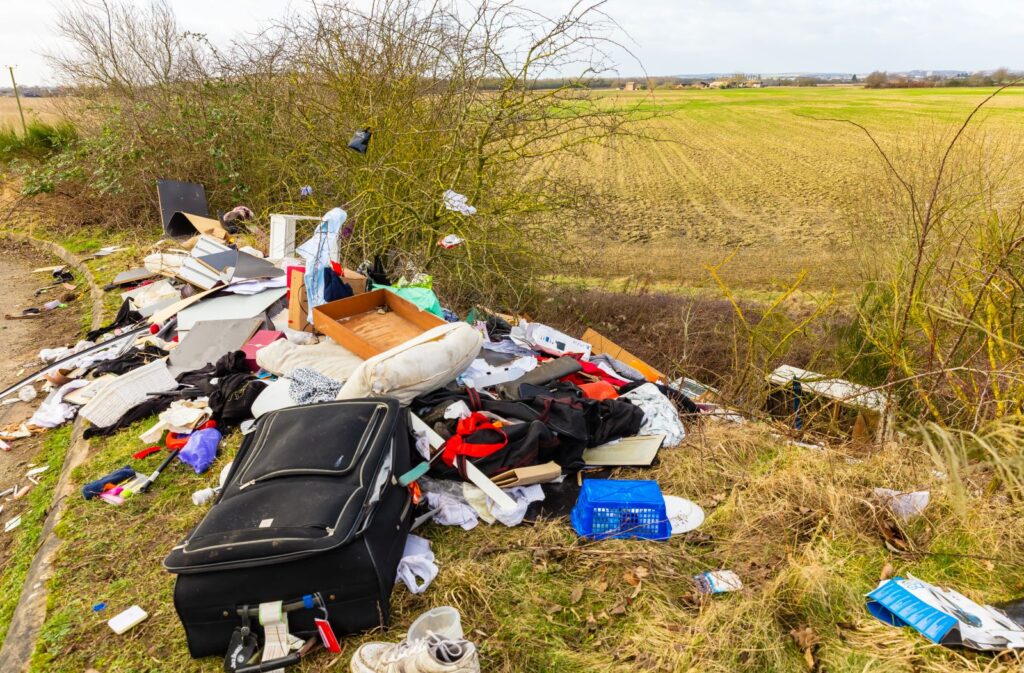Nearly a fifth of waste in England falls into criminal hands, survey finds
6th July 2023
A survey conducted by the Environment Agency has revealed that 18% of all waste produced in England may be illegally handled, with farmers reporting financial cost and visual blight as the main detrimental impacts of waste crime.
Waste crime encompasses a range of illegal activities, including the dumping, burning, illegal shipping and misdescription of waste, as well as the operation of illegal waste sites. Industry research suggests illegal waste management costs the economy £1 billion per year through evaded tax, environmental and social harm and lost legitimate business.
In February 2023, the Environment Agency asked farmers/landowners, service providers and members of the waste industry to complete an online survey to provide insight into the nature and scale of waste crime in England.
The survey was designed through consultation with a range of stakeholders, including the National Farmers Union, to help the Agency’s efforts combatting waste crime. The most engagement was seen from farmers/landowners with 459 responses received, as opposed to 346 from the waste industry and 84 from service providers.
The response from farming community is not surprising, as fly tipping on agricultural land is still a major problem in the UK despite declining trends last year. Defra figures have shown a total of 4,156 agricultural fly-tipping incidents were reported across England in 2021/22, down from 5,538 incidents the previous year.
Fly tipping can also constitute a major expense to farmers, with clean-up costs ranging from £1,000 for smaller incidents to as high as £10,000.
Respondents to the Environment Agency’s third national survey on waste crime estimated that around 18% of waste in England is illegally managed, equivalent to 34 million tonnes every year, enough to fill 4 million skips.
However, only 24% of waste crime is perceived to be reported to the authorities, with many organisations raising concerns around reporting mechanisms and enforcement action.
Of respondents who had been impacted by waste crime, the financial costs (of clean-up and otherwise) and the disruption to business affected the highest percentage of respondents, with some variation between groups.

Source National Waste Crime Survey 2023.
The survey also found that increased cost of living is believed to be accelerating the scale of waste crime, as individuals and businesses seek to minimise costs. Moreover, respondents estimated that almost a third (31%) of waste crime is committed by organised crime groups, while 18% were aware of criminal activities being arranged via Facebook.
Meanwhile, an overwhelming majority of participants felt that the Environment Agency lacks adequate resources to effectively handle waste crime. The general consensus was that waste crime requires severe sanctions, with court-issued penalties, visible activities, disruption tactics and criminal sanctions considered the most effective deterrents.
Jacob Hayler, executive director of the Environmental Services Association (ESA), commented:
“The survey response reinforces the fact that waste crime is widespread and underscores the need for effective and well-resourced enforcement alongside tougher penalties for those successfully prosecuted. The ESA and its members want to work with the Environment Agency, and the Joint Unit for Waste Crime, to help achieve these goals.”
The survey findings provide the Agency with the evidence needed to update and refine approaches to enforcement continually as criminals shift their ways of working. Stopping and shutting down criminals in the waste sector remains a top priority.

